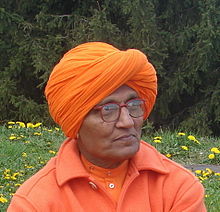Swami Agnivesh
| Agnivesh अग्निवेश |
|
|---|---|
 |
|
| Born |
21 September 1939 Srikakulam, Andhra Pradesh, India |
| Nationality | Indian |
| Occupation | Social worker, scholar, politician |
Agnivesh (or Swami Agnivesh; born 21 September 1939) is an Indian politician and a former Member of Legislative Assembly from the Indian state of Haryana, an Arya Samaj scholar, and a social activist. He is best known for his work against bonded labour through the Bonded Labour Liberation Front, which he founded in 1981. Agnivesh became president (2004-2014) of the World Council of Arya Samaj, which is the highest international body of the Arya Samaj movement originally established by Swami Dayanand Saraswati in 1875, and served as the chairperson of the United Nations Voluntary Trust Fund on Contemporary Forms of Slavery from 1994 to 2004.
Swami Agnivesh was born Vepa Shyam Rao on 21 September 1939 in an orthodox Hindu family of Srikakulam in Andhra Pradesh. He lost his father at the age of four. He was brought up by his maternal grandfather who was the Diwan of a princely state called Shakti, now in Chhattisgarh. He gained degrees in Law and Commerce, became a lecturer in management at the reputed St Xavier's College in Kolkata and for a while practiced law as a junior to Sabyasachi Mukherji who later would become Chief Justice of India.
In 1970, Agnivesh founded Arya Sabha, a political party based on Arya Samaj principles as he himself formulated in his 1974 book, Vaidik Samajvad.
Agnivesh became a member of the Legislative Assembly of Haryana in 1977, and served as a cabinet Minister for Education in 1979 . In 1981, while still a minister, he founded the Bonded Labour Liberation Front, which continues to raise issues surrounding bonded labour in India, especially in the quarries in and around Delhi; he remains the chairperson of the organisation. After leaving the Ministry, he was arrested twice, spending a total of 14 months in jail on charges of subversion and murder, of which he was later acquitted.
...
Wikipedia
